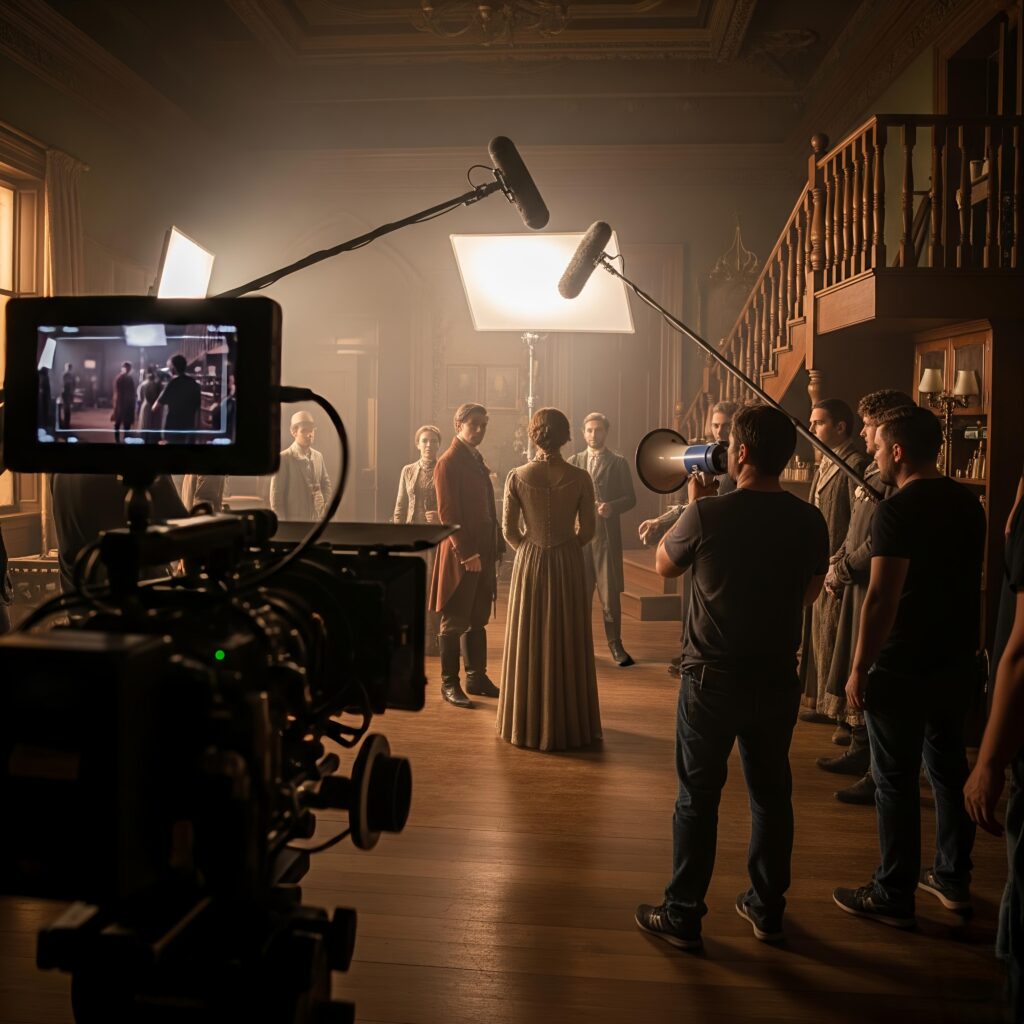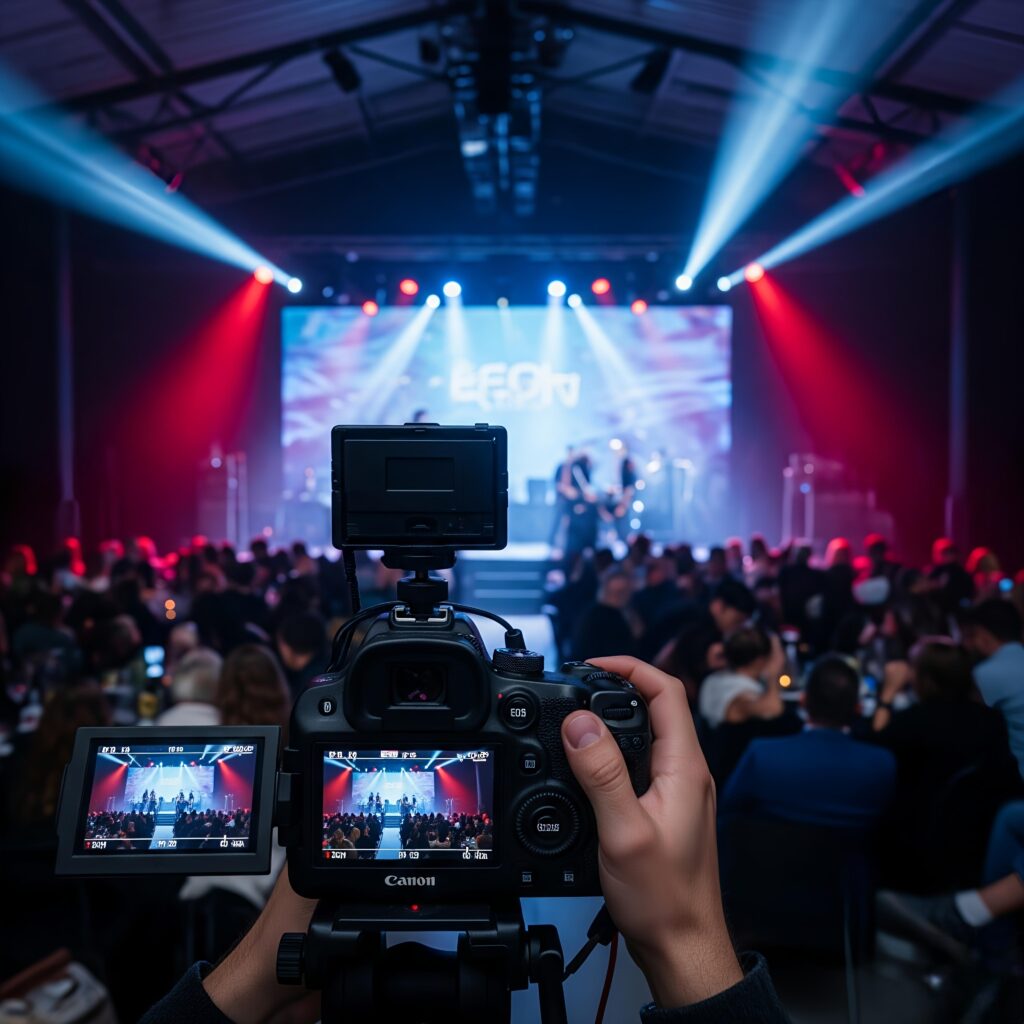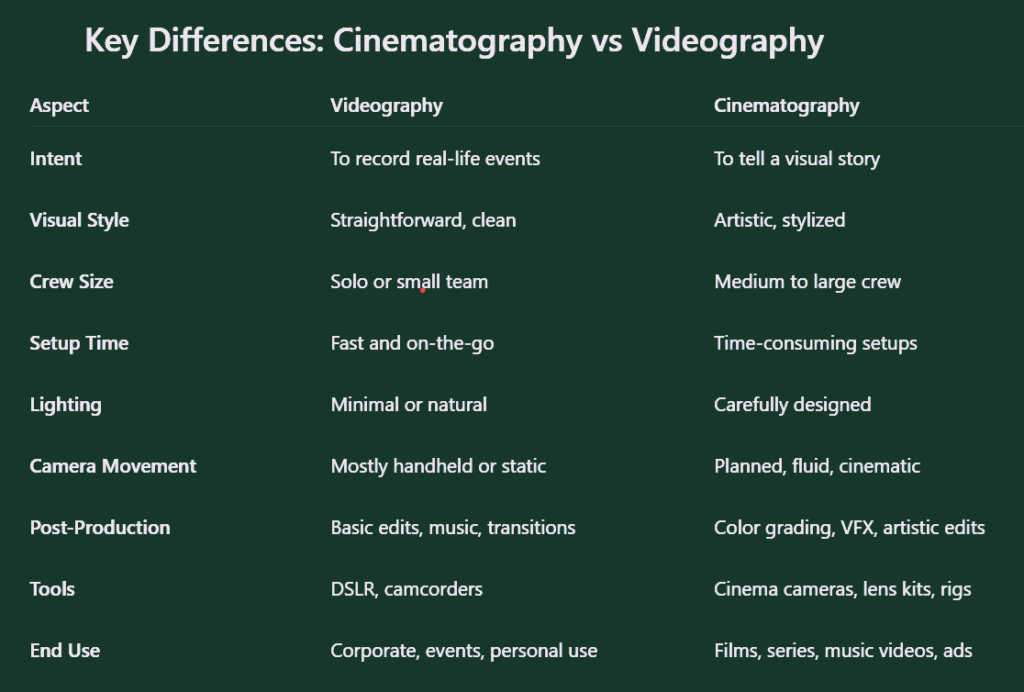What Is the True Difference Between Cinematography and Videography?
The introduction:
The terms “cinematography” and “videography” are frequently used interchangeably in today’s content-driven society. Both titles are often used, whether you’re documenting a wedding, shooting a short video, or producing material for YouTube. However, it’s crucial to realize that cinematography and videography are very different if you’re serious about expressing stories visually.
The true differences between cinematography and videography are examined in this blog article, not only in terms of technical aspects but also in terms of attitude, storytelling style, creative goal, and industrial context. Whether you’re a client hiring a camera professional, a content producer, or an aspiring filmmaker, this post will help you make sense of the situation and pick the best option—or the appropriate person—for your project.
Cinematography: What is it?

Visual storytelling is the art and science of cinematography. Scenes for movies, TV shows, advertisements, or music videos are created utilizing methods such as:
- angles of the camera
- Lens choices
- Composition and framing
- Design of lighting
- Color grading
- Control of emotions and mood
The director, production designer, and lighting crew collaborate closely with cinematographers, sometimes known as directors of photography, or DoPs, to make a story come to life. It is their responsibility to convert the script into visual poetry.
A Cinematographer’s Workflow:
- collaborates with the director to conceptualize the style and mood.
- Selects filters, lighting, lenses, and cameras
- Utilizes focus pullers and gaffers
- organizes intricate lighting and camera movements.
- oversees each scene’s visual coherence.
Goal:
Cinematography’s goal is to use well-crafted images to arouse feelings and strengthen the story. It is stylish, deliberate, and frequently quite cooperative.
Videography: What is it?

The introduction:
Videography is the art of recording events, moments, or real-life happenings on camera, frequently in an uncomplicated and useful way. Videographers typically work alone or with small teams, capturing events like as:
- weddings
- business gatherings
- Gatherings of
- Conversations with
- demonstrations of products
- YouTube vlogs
A videographer’s workflow:
- controls the camera.
- Recording live audio
- Performs fast setups and breakdowns
- frequently manages music, editing, and delivery
Goal:
Typically, videography aims to capture reality as it occurs, frequently with little preparation and under time pressure. It’s effective, tidy, and useful.
Cinematography vs. Videography: Key Differences:

Examples from the Real World:
- A cinematographer may produce a short film with a wedding theme, using artistic framing, expressive camera motions, and well-executed lighting to transform the narrative into a cinematic experience.
- Cinematographer: Plans each shot to align with the tone and values of the brand while producing a short film for the same firm.
- A videographer, like a journalist with a camera, may cover a wedding, documenting every detail of the day with little intervention.
- A videographer records a business seminar in open light, ensuring that both the audio and the video are clear.
Tools of the Trade:
Typical Equipment for Cinematographers:
- Cinema cameras (such as Blackmagic URSA, ARRI Alexa, and RED Komodo)
- Zeiss, Cooke, and Sigma Cine are examples of prime lens sets.
- Lighting kits for professionals (ARRI, Aputure)
- Grip tools (crane, jib, dolly, and matte boxes)
- Software for color grading (DaVinci Resolve)
Typical Equipment for Videographers:
- Mirrorless and DSLR cameras (such as the Sony A7 and Canon R5)
- Monopod or gimbal
- On-camera microphone
- LED displays
- Adobe Premiere Pro and other editing applications
Are You in Need of One?
How to make a decision:
A cinematographer should be chosen if:
- You’re creating a music video, commercial, or short film.
- Mood and storytelling are really important.
- You’re looking for a sleek, cinematic look.
- You can spend money on a team and planning time.
A videographer should be chosen if:
- You must have a recording of the incident.
- Time and money are both limited.
- You want your order to arrive quickly.
- The content is more significant than the visuals.
Conclusions:
Cinematography and videography differ in goal, creativity, and storytelling philosophy, not only equipment or financial constraints.
The goal of cinematography is to use images to convey meaning, emotion, and atmosphere. Filmmaking is the art of catching moments as they happen. They are both significant. Each has its role. Understanding the distinction, however, enables you to choose the best professional to hire or to follow your career route.
Therefore, whether you’re holding a DSLR to record your friend’s wedding or you’re dreaming of shooting an independent film on 35mm, keep in mind that it’s more important to consider how and why you take pictures than what you really capture.
Visual Storyteller and Director of Photography Vimall S Mishra..